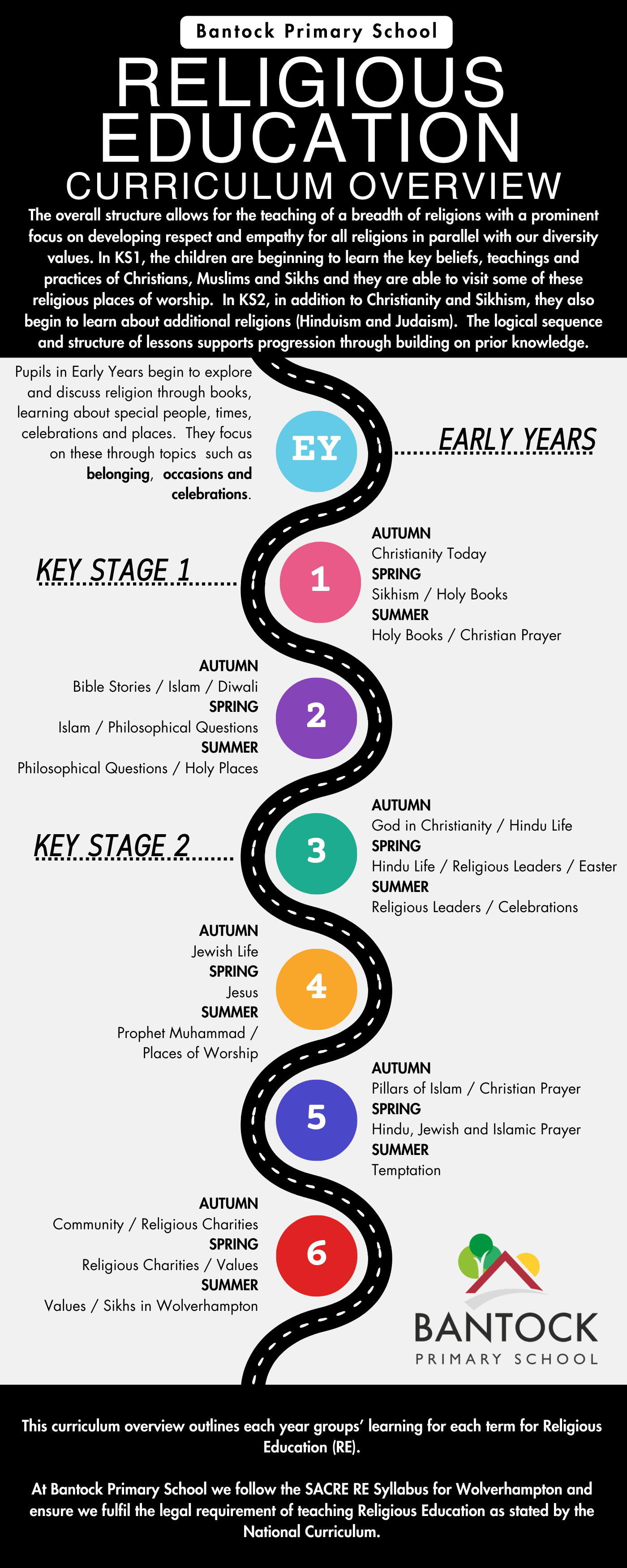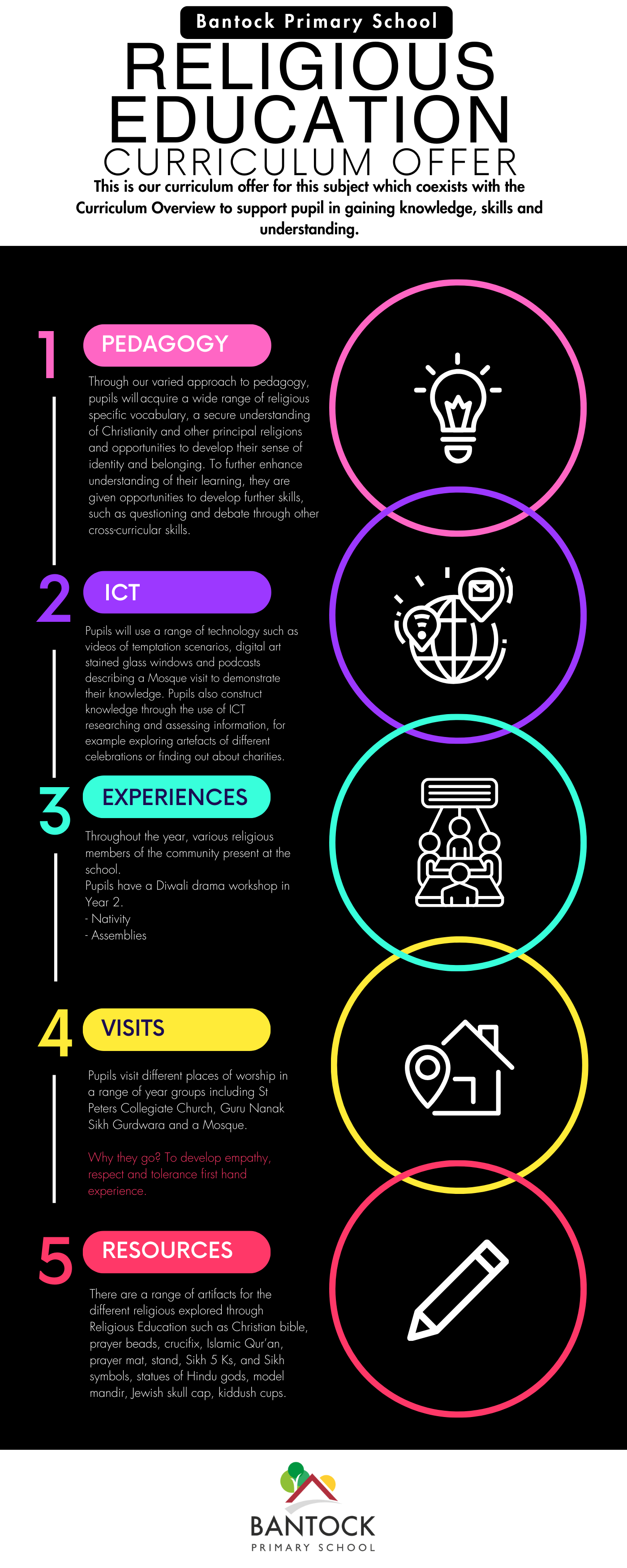Religious Education
SHINE in Religious Education
Succeed
We want all pupils to confidently utilise the essential skills of RE and develop these aspects to a high standard, constantly striving towards creating a cohesive community. We want to develop their sense of identity and belonging, to provide opportunity for them to develop respect and sensitivity to others.
Happy
We will provide a motivating learning environment to ensure we promote a culture of happiness and enjoyment across all aspects of RE, where learning challenges are language rich. Our varied RE curriculum brings opportunities to explore, investigate and to be challenged whilst being submerged in new terminology through the use of Goldilocks Words. Pupils’ attitudes are praised and their contributions as individuals are valued.
Inspire
We will inspire all pupils through our varied approach and providing a stimulating RE curriculum, which inspires life-long knowledge, skills and understanding. Pupils are given opportunities to visit places of worship so they are able to experience something they wouldn’t otherwise have been able to experience. Also, we will provide access to authentic artefacts allowing children to gain better knowledge and understanding.
Nurture
We will build strong foundations with parents and pupils, based on honesty and respect for each other’s differences. We will scaffold and nurture quality – first learning opportunities, whilst celebrating and supporting diversity, in order to foster independent learning and application, across the RE curriculum.
Educate
We will ensure all are given the opportunity to explore beliefs about God and what it means to be human and for them to develop respect and sensitivity to others, in particular those with faiths and beliefs different to their own, to combat prejudice and to prepare pupils for adult life.


Downloads
RE Curriculum Overview
Progression in Skills
Wolverhampton SACRE Syllabus
Collective Worship and Assemblies
Non-denominational Religious Education is provided for all children as part of the curriculum and is in accordance with the Locally Agreed Country Religious Education syllabus. Assembly is an important part of the school day when we meet together as a community. It is a time when we place emphasis on the development of values and attitudes towards each other and the world around us.
In line with the 1988 Education Act we ensure collective worship takes place, either in class or as a school. The act of worship supports the social and emotional aspects of learning. They include a variety of elements including: reflection, music, drama, stories, celebrations of festivals and achievements, experience of different traditions and beliefs, and raising awareness of national and international events.
Right to Withdraw
Parents/carers have the right to withdraw their child from Religious Education on the grounds that they wish to provide their own RE and this provision will be the parents’ responsibility (School Standards and Framework Act 1998 S71 (3). If parents wish to withdraw their child from Religious Education, parents are to put their request in writing to the Head Teacher. There then will be a discussion/meeting between the parents/carers and the RE lead and class teacher to first discuss the intentions of RE at Bantock Primary School to ensure parents are fully informed of the importance of teaching RE. If the parent still would like to withdraw their child from RE, their child will be added to the RE withdrawal register and will establish how the child’s withdrawal can be best accommodated. Then parents/ carers will be sent a letter to confirm the withdrawal.
Religious Education and the school Curriculum – SACRE agreed syllabus for Wolverhampton
Religious education actively promotes the values of truth, justice respect for all, care of the environment and human stewardship of the earth. It places specific emphasis on:
- Pupils valuing themselves and others.
- The role of the family and the community in religious belief and activity.
- The celebration of diversity in society through understanding similarities and differences.
- Recognition of the changing nature of society, religious practice and expression
- The influence of religion in the local, national and global community.
- Sustainable development of the earth.
The Wolverhampton Agreed Syllabus has identified the following key aims for Religious Education and the School Curriculum:
The contributions of religious education to the aims of the school curriculum
Aim 1: The school curriculum should aim to provide opportunities for all pupils to learn and achieve.
- should be stimulating, interesting and enjoyable.
- should promote the best possible progress and attainment for all pupils
- should develop independent and interdependent learning
- should contribute to pupils’ skills in Literacy and ICT
- should promote an enquiring approach to issues of belief and truth in religion
- should enable pupils to evaluate thoughtfully their own and others’ views, in a reasoned and informed manner
Aim 2: The school curriculum should aim to promote pupils’ spiritual, moral, social and cultural development and prepare them for all the opportunities, responsibilities and experiences of life.
- focuses on ultimate questions and ethical issues.
- enables pupils to appreciate their own and others’ beliefs and cultures and how these affect individuals, communities and societies
- develops pupils’ awareness of themselves and others
- develops a clear understanding of religions in the world today
- enables pupils to learn about the ways different faith communities relate to each other.
Due to the unique demographic of Wolverhampton and Bantock Primary School’s local community, we aim to provide a high standard of Religious Education (SACRE agreed syllabus for Wolverhampton) , by provoking challenging questions about human life, beliefs, communities and ideas. We will develop their awareness of Christianity, and other principal religions that have a significant local presence (Sikhism, Hinduism and Islam) and their religious traditions. This includes exploring spiritual and cultural traditions of these religions and considering issues of right and wrong. Through our varied approach to pedagogy, pupils will acquire a wide range of religious specific vocabulary (goldilocks words), a secure understanding of Christianity and other principal religions (Sikhism, Hinduism and Islam) and opportunities to develop their sense of identity and belonging. Pupils will be taught different religions and worldviews about different ways of life in local, national and global contexts and they will discover, explore and consider many different answers to questions about human identity, meaning and value. Children will also be taught to disagree respectfully, to be reasonable in their responses to religions and worldviews and to respond by expressing insights into their own and others’ lives. Fundamentally, pupils will think rigorously, creatively, imaginatively and respectfully about their ideas in relation to religions and worldviews.
Children at Bantock will develop their awareness of Christianity, and other principal religions that have a significant local presence (Sikhism, Hinduism and Islam) and their religious traditions. This includes exploring spiritual and cultural traditions of these religions and considering issues of right and wrong. They will also explore the different beliefs about God and what it means to be a good human being. Teaching should equip pupils with knowledge and understanding of a range of religions and worldviews, enabling them to develop their ideas, values and identity. It should develop an aptitude for dialogue in pupils so that they can participate positively in our society which is diverse in relation to religions and worldviews. Pupils learn how to study religions and worldviews systematically, making progress by reflecting on the impact of religions and worldviews on contemporary life locally, nationally and globally to increasing levels of complexity and depth. Pupils gain and deploy the skills needed to interpret and evaluate evidence, texts and sources of wisdom or authority. They learn to articulate clear and coherent accounts of their personal beliefs, ideas, values and experiences while respecting the right of others to have different views, values and ways of life.
|
Rights Respecting School Convention on the Rights of the Child |
13 – Sharing thoughts freely 14 – Freedom of thought, and religion 15 – Setting up or joining groups 29 – Aims of education 30 – Minority culture, language and religion 31 – Rest, play, culture and arts |